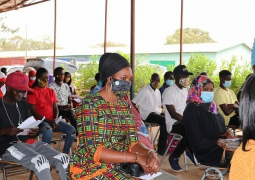
The idea is aimed at promoting mental well-being and addressing drug and alcohol issues.
Organisations such as Mobee The Gambia, WAYAS Counselling and Psychotherapy Service play key role in sensitising youth on mental wellbeing.
The formulation of an appropriate and carefully prioritized policy is a key element in achieving the implementation of an effective and sustainable mental health care system.
This ten-year policy sets out the main directions The Gambia will take to provide effective treatment and care to the thousands of people suffering from mental and substance abuse disorders.
An important emphasis is placed on providing mental health service integrated into the wider general health sector, and putting an end to stigma and discrimination towards people with mental disorders and promoting mental health more generally.
The policy, which should be read in conjunction with accompanying five-year action plan, is part of the overall development effort under way in The Gambia.
The Gambian Governments’ Department of Health and Social Welfare and the National Mental Health Taskforces’ Technical Committee have drafted the policy after an in-depth situational analysis and extensive consultation with many different stakeholders from the communities.
The Mental Health Policy is an organised set of values, principles, objectives and areas for action to improve the mental health of the population, as follows:
Value: A cultural belief concerning a desirable mode of behaviour or end-state, which guides attitudes, judgements and comparisons.
Principle: A fundamental truth or doctrine on which rules of conduct are based.
Primary prevention: This is to alter conditions that precipitate mental disorders and behavioural problems.
Secondary prevention: It’s an early detection mechanism, limiting the negative consequences once a psychological problem has manifested itself.
Tertiary prevention: This is to control the long-term effects of chronic mental health problems.
Mental Health: A state of emotional and psychological well-being in which an individual is able to use his or her cognitive and emotional capabilities, function in society, and meet the ordinary demands of everyday life.
Mental Disorder: the existence of a clinically recognizable set of symptoms or behaviour associated in most cases with distress and with interference with personal functions.
Meanwhile, the in-depth situational analysis and broad consultation process led in The Gambia, as part of the policy development process, have revealed a number of challenges for development and implementation of a realistic and progressive mental health policy at national level.
The inadequacy of human resources available to deliver appropriate mental health care is a major challenge for The Gambia.
Recruitment and training of health workers in mental health should be a central component of the policy and plan in order to be able to achieve the objectives.
The inadequacy of specialised staff with sufficient skills to provide training to other health workers should also be addressed.
Read Other Articles In Youth Forum





